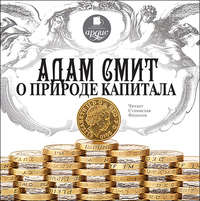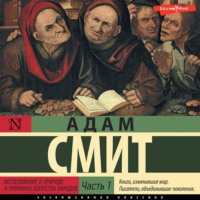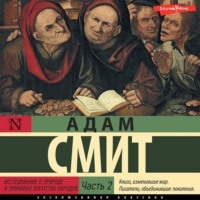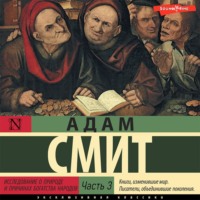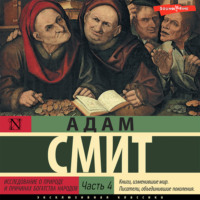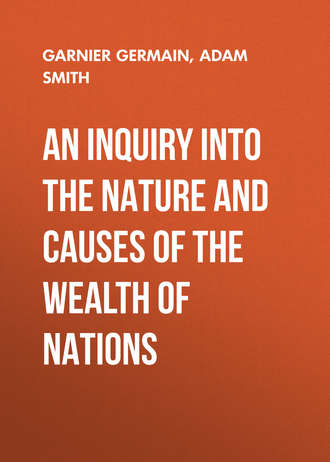 полная версия
полная версияAn Inquiry Into the Nature and Causes of the Wealth of Nations
Whatever, therefore, may have been the increase in the quantity of the precious metals, which, during the period between the middle of the fourteenth and that of the sixteenth century, arose from the increase of wealth and improvement, it could have no tendency to diminish their value, either in Great Britain, or in any other part of Europe. If those who have collected the prices of things in ancient times, therefore, had, during this period, no reason to infer the diminution of the value of silver from any observations which they had made upon the prices either of corn, or of other commodities, they had still less reason to infer it from any supposed increase of wealth and improvement.
Second Period.– But how various soever may have been the opinions of the learned concerning the progress of the value of silver during the first period, they are unanimous concerning it during the second.
From about 1570 to about 1640, during a period of about seventy years, the variation in the proportion between the value of silver and that of corn held a quite opposite course. Silver sunk in its real value, or would exchange for a smaller quantity of labour than before; and corn rose in its nominal price, and, instead of being commonly sold for about two ounces of silver the quarter, or about ten shillings of our present money, came to be sold for six and eight ounces of silver the quarter, or about thirty and forty shillings of our present money.
The discovery of the abundant mines of America seems to have been the sole cause of this diminution in the value of silver, in proportion to that of corn. It is accounted for, accordingly, in the same manner by every body; and there never has been any dispute, either about the fact, or about the cause of it. The greater part of Europe was, during this period, advancing in industry and improvement, and the demand for silver must consequently have been increasing; but the increase of the supply had, it seems, so far exceeded that of the demand, that the value of that metal sunk considerably. The discovery of the mines of America, it is to be observed, does not seem to have had any very sensible effect upon the prices of things in England, till after 1570; even though the mines of Potosi had been discovered more than twenty years before.
From 1595 to 1620, both inclusive, the average price of the quarter of nine bushels of the best wheat, at Windsor market, appears, from the accounts of Eton college, to have been L.2: 1: 69⁄13. From which sum, neglecting the fraction, and deducting a ninth, or 4s. 71⁄3d., the price of the quarter of eight bushels comes out to have been L.1: 16: 102⁄3. And from this sum, neglecting likewise the fraction, and deducting a ninth, or 4s. 11⁄9d., for the difference between the price of the best wheat and that of the middle wheat, the price of the middle wheat comes out to have been about L.1: 12: 88⁄9, or about six ounces and one-third of an ounce of silver.
From 1621 to 1636, both inclusive, the average price of the same measure of the best wheat, at the same market, appears, from the same accounts, to have been L.2: 10s.; from which, making the like deductions as in the foregoing case, the average price of the quarter of eight bushels of middle wheat comes out to have been L.1: 19: 6, or about seven ounces and two-thirds of an ounce of silver.
Third Period.– Between 1630 and 1640, or about 1636, the effect of the discovery of the mines of America, is reducing the value of silver, appears to have been completed, and the value of that metal seems never to have sunk lower in proportion to that of corn than it was about that time. It seems to have risen somewhat in the course of the present century, and it had probably begun to do so, even some time before the end of the last.
From 1637 to 1700, both inclusive, being the sixty-four last years of the last century, the average price of the quarter of nine bushels of the best wheat, at Windsor market, appears, from the same accounts, to have been L.2: 11: 01⁄3, which is only 1s. 01⁄3d. dearer than it had been during the sixteen years before. But, in the course of these sixty-four years, there happened two events, which must have produced a much greater scarcity of corn than what the course of the seasons would otherwise have occasioned, and which, therefore, without supposing any further reduction in the value of silver, will much more than account for this very small enhancement of price.
The first of these events was the civil war, which, by discouraging tillage and interrupting commerce, must have raised the price of corn much above what the course of the seasons would otherwise have occasioned. It must have had this effect, more or less, at all the different markets in the kingdom, but particularly at those in the neighborhood of London, which require to be supplied from the greatest distance. In 1648, accordingly, the price of the best wheat, at Windsor market, appears, from the same accounts, to have been L.4: 5s., and, in 1649, to have been L.4, the quarter of nine bushels. The excess of those two years above L.2 10s. (the average price of the sixteen years preceding 1637) is L.3 5s., which, divided among the sixty-four last years of the last century, will alone very nearly account for that small enhancement of price which seems to have taken place in them. These, however, though the highest, are by no means the only high prices which seem to have been occasioned by the civil wars.
The second event was the bounty upon the exportation of corn, granted in 1688. The bounty, it has been thought by many people, by encouraging tillage, may, in a long course of years, have occasioned a greater abundance, and, consequently, a greater cheapness of corn in the home market, than what would otherwise have taken place there. How far the bounty could produce this effect at any time I shall examine hereafter: I shall only observe at present, that between 1688 and 1700, it had not time to produce any such effect. During this short period, its only effect must have been, by encouraging the exportation of the surplus produce of every year, and thereby hindering the abundance of one year from compensating the scarcity of another, to raise the price in the home market. The scarcity which prevailed in England, from 1693 to 1699, both inclusive, though no doubt principally owing to the badness of the seasons, and, therefore, extending through a considerable part of Europe, must have been somewhat enhanced by the bounty. In 1699, accordingly, the further exportation of corn was prohibited for nine months.
There was a third event which occurred in the course of the same period, and which, though it could not occasion any scarcity of corn, nor, perhaps, any augmentation in the real quantity of silver which was usually paid for it, must necessarily have occasioned some augmentation in the nominal sum. This event was the great debasement of the silver coin, by clipping and wearing. This evil had begun in the reign of Charles II. and had gone on continually increasing till 1695; at which time, as we may learn from Mr Lowndes, the current silver coin was, at an average, near five-and-twenty per cent. below its standard value. But the nominal sum which constitutes the market price of every commodity is necessarily regulated, not so much by the quantity of silver, which, according to the standard, ought to be contained in it, as by that which, it is found by experience, actually is contained in it. This nominal sum, therefore, is necessarily higher when the coin is much debased by clipping and wearing, than when near to its standard value.
In the course of the present century, the silver coin has not at any time been more below its standard weight than it is at present. But though very much defaced, its value has been kept up by that of the gold coin, for which it is exchanged. For though, before the late recoinage, the gold coin was a good deal defaced too, it was less so than the silver. In 1695, on the contrary, the value of the silver coin was not kept up by the gold coin; a guinea then commonly exchanging for thirty shillings of the worn and clipt silver. Before the late recoinage of the gold, the price of silver bullion was seldom higher than five shillings and sevenpence an ounce, which is but fivepence above the mint price. But in 1695, the common price of silver bullion was six shillings and fivepence an ounce,17 which is fifteen pence above the mint price. Even before the late recoinage of the gold, therefore, the coin, gold and silver together, when compared with silver bullion, was not supposed to be more than eight per cent below its standard value. In 1695, on the contrary, it had been supposed to be near five-and-twenty per cent. below that value. But in the beginning of the present century, that is, immediately after the great recoinage in King William's time, the greater part of the current silver coin must have been still nearer to its standard weight than it is at present. In the course of the present century, too, there has been no great public calamity, such as a civil war, which could rather discourage, or interrupt the interior commerce of the country. And though the bounty which has taken place through the greater part of this century, must always raise the price of corn somewhat higher than it otherwise would be in the actual state of tillage; yet, as in the course of this century, the bounty has had full time to produce all the good effects commonly imputed to it to encourage tillage, and thereby to increase the quantity of corn in the home market, it may, open the principles of a system which I shall explain and examine hereafter, be supposed to have done something to lower the price of that commodity the one way, as well as to raise it the other. It is by many people supposed to have done more. In the sixty-four years of the present century, accordingly, the average price of the quarter of nine bushels of the best wheat, at Windsor market, appears, by the accounts of Eton college, to have been L.2: 0: 610⁄32, which is about ten shillings and sixpence, or more than five-and-twenty per cent. cheaper than it had been during the sixty-four last years of the last century; and about nine shillings and sixpence cheaper than is had been during the sixteen years preceding 1636, when the discovery of the abundant mines of America may be supposed to have produced its full effect; and about one shilling cheaper than it had been in the twenty-six years preceding 1620, before that discovery can well be supposed to have produced its full effect. According to this account, the average price of middle wheat, during these sixty-four first years of the present century, comes out to have been about thirty-two shillings the quarter of eight bushels.
The value of silver, therefore, seems to have risen somewhat in proportion to that of corn during the course of the present century, and it had probably begun to do so even some time before the end of the last.
In 1687, the price of the quarter of nine bushels of the best wheat, at Windsor market, was L.1: 5: 2, the lowest price at which it had ever been from 1595.
In 1688, Mr Gregory King, a man famous for his knowledge in matters of this kind, estimated the average price of wheat, in years of moderate plenty, to be to the grower 3s. 6d. the bushel, or eight-and-twenty shillings the quarter. The grower's price I understand to be the same with what is sometimes called the contract price, or the price at which a farmer contracts for a certain number of years to deliver a certain quantity of corn to a dealer. As a contract of this kind saves the farmer the expense and trouble of marketing, the contract price is generally lower than what is supposed to be the average market price. Mr King had judged eight-and-twenty shillings the quarter to be at that time the ordinary contract price in years of moderate plenty. Before the scarcity occasioned by the late extraordinary course of bad seasons, it was, I have been assured, the ordinary contract price in all common years.
In 1688 was granted the parliamentary bounty upon the exportation of corn. The country gentlemen, who then composed a still greater proportion of the legislature than they do at present, had felt that the money price of corn was falling. The bounty was an expedient to raise it artificially to the high price at which it had frequently been sold in times of Charles I. and II. It was to take place, therefore, till wheat was so high as forty-eight shillings the quarter; that is, twenty shillings, or 5-7ths dearer than Mr King had, in that very year, estimated the grower's price to be in times of moderate plenty. If his calculations deserve any part of the reputation which they have obtained very universally, eight-and-forty shillings the quarter was a price which, without some such expedient as the bounty, could not at that time be expected, except in years of extraordinary scarcity. But the government of King William was not then fully settled. It was in no condition to refuse any thing to the country gentlemen, from whom it was, at that very time, soliciting the first establishment of the annual land-tax.
The value of silver, therefore, in proportion to that of corn, had probably risen somewhat before the end of the last century, and it seems to have continued to do so during the course of the greater part of the present, though the necessary operation of the bounty must have hindered that time from being so sensible as it otherwise would have been in the actual state of tillage.
In plentiful years, the bounty, by occasioning an extraordinary exportation, necessarily raises the price of corn above what it otherwise would be in those years. To encourage tillage, by keeping up the price of corn, even in the most plentiful years, was the avowed end of the institution.
In years of great scarcity, indeed, the bounty has generally been suspended. It must, however, have had some effect upon the prices of many of these years. By the extraordinary exportation which it occasions in years of plenty, it must frequently hinder the plenty of one year from compensating the scarcity of another.
Both in years of plenty and in years of scarcity, therefore, the bounty raises the price of corn above what it naturally would be in the actual state of tillage. If during the sixty-four first years of the present century, therefore, the average price has been lower than during the sixty-four last years of the last century, it must, in the same state of tillage, have been much more so, had it not been for this operation of the bounty.
But, without the bounty, it maybe said the state of tillage would not have been the same. What may have been the effects of this institution upon the agriculture of the country, I shall endeavour to explain hereafter, when I come to treat particularly of bounties. I shall only observe at present, that this rise in the value of silver, in proportion to that of corn, has not been peculiar to England. It has been observed to have taken place in France during the same period, and nearly in the same proportion, too, by three very faithful, diligent, and laborious collectors of the prices of corn, Mr Dupré de St Maur, Mr Messance, and the author of the Essay on the Police of Grain. But in France, till 1764, the exportation of grain was by law prohibited; and it is somewhat difficult to suppose, that nearly the same diminution of price which took place in one country, notwithstanding this prohibition, should, in another, be owing to the extraordinary encouragement given to exportation.
It would be more proper, perhaps, to consider this variation in the average money price of corn as the effect rather of some gradual rise in the real value of silver in the European market, than of any fall in the real average value of corn. Corn, it has already been observed, is, at distant periods of time, a more accurate measure of value than either silver or, perhaps, any other commodity. When, after the discovery of the abundant mines of America, corn rose to three and four times its former money price, this change was universally ascribed, not to any rise in the real value of corn, but to a fall in the real value of silver. If, during the sixty-four first years of the present century, therefore, the average money price of corn has fallen somewhat below what it had been during the greater part of the last century, we should, in the same manner, impute this change, not to any fall in the real value of corn, but to some rise in the real value of silver in the European market.
The high price of corn during these ten or twelve years past, indeed, has occasioned a suspicion that the real value of silver still continues to fall in the European market. This high price of corn, however, seems evidently to have been the effect of the extraordinary unfavourableness of the seasons, and ought, therefore, to be regarded, not as a permanent, but as a transitory and occasional event. The seasons, for these ten or twelve years past, have been unfavourable through the greater part of Europe; and the disorders of Poland have very much increased the scarcity in all those countries, which, in dear years, used to be supplied from that market. So long a course of bad seasons, though not a very common event, is by no means a singular one; and whoever has inquired much into the history of the prices of corn in former times, will be at no loss to recollect several other examples of the same kind. Ten years of extraordinary scarcity, besides, are not more wonderful than ten years of extraordinary plenty. The low price of corn, from 1741 to 1750, both inclusive, may very well be set in opposition to its high price during these last eight or ten years. From 1741 to 1750, the average price of the quarter of nine bushels of the best wheat, at Windsor market, it appears from the accounts of Eton College, was only L.1: 13: 94⁄5, which is nearly 6s. 3d. below the average price of the sixty-four first years of the present century. The average price of the quarter of eight bushels of middle wheat comes out, according to this account, to have been, during these ten years, only L.1: 6: 8.
Between 1741 and 1750, however, the bounty must have hindered the price of corn from falling so low in the home market as it naturally would have done. During these ten years, the quantity of all sorts of grain exported, it appears from the custom-house books, amounted to no less than 8,029,156 quarters, one bushel. The bounty paid for this amounted to L.1,514,962: 17: 4½. In 1749, accordingly, Mr Pelham, at that time prime minister, observed to the house of commons, that, for the three years preceding, a very extraordinary sum had been paid as bounty for the exportation of corn. He had good reason to make this observation, and in the following year he might have had still better. In that single year, the bounty paid amounted to no less than L.324,176: 10: 6.18 It is unnecessary to observe how much this forced exportation must have raised the price of corn above what it otherwise would have been in the home market.
At the end of the accounts annexed to this chapter the reader will find the particular account of those ten years separated from the rest. He will find there, too, the particular account of the preceding ten years, of which the average is likewise below, though not so much below, the general average of the sixty-four first years of the century. The year 1740, however, was a year of extraordinary scarcity. These twenty years preceding 1750 may very well be set in opposition to the twenty preceding 1770. As the former were a good deal below the general average of the century, notwithstanding the intervention of one or two dear years; so the latter have been a good deal above it, notwithstanding the intervention of one or two cheap ones, of 1759, for example. If the former have not been as much below the general average as the latter have been above it, we ought probably to impute it to the bounty. The change has evidently been too sudden to be ascribed to any change in the value of silver, which is always slow and gradual. The suddenness of the effect can be accounted for only by a cause which can operate suddenly, the accidental variations of the seasons.
The money price of labour in Great Britain has, indeed, risen during the course of the present century. This, however, seems to be the effect, not so much of any diminution in the value of silver in the European market, as of an increase in the demand for labour in Great Britain, arising from the great, and almost universal prosperity of the country. In France, a country not altogether so prosperous, the money price of labour has, since the middle of the last century, been observed to sink gradually with the average money price of corn. Both in the last century and in the present, the day wages of common labour are there said to have been pretty uniformly about the twentieth part of the average price of the septier of wheat; a measure which contains a little more than four Winchester bushels. In Great Britain, the real recompence of labour, it has already been shewn, the real quantities of the necessaries and conveniencies of life which are given to the labourer, has increased considerably during the course of the present century. The rise in its money price seems to have been the effect, not of any diminution of the value of silver in the general market of Europe, but of a rise in the real price of labour, in the particular market of Great Britain, owing to the peculiarly happy circumstances of the country.
For some time after the first discovery of America, silver would continue to sell at its former, or not much below its former price. The profits of mining would for some time be very great, and much above their natural rate. Those who imported that metal into Europe, however, would soon find that the whole annual importation could not be disposed of at this high price. Silver would gradually exchange for a smaller and a smaller quantity of goods. Its price would sink gradually lower and lower, till it fell to its natural price; or to what was just sufficient to pay, according to their natural rates, the wages of the labour, the profits of the stock, and the rent of the land, which must be paid in order to bring it from the mine to the market. In the greater part of the silver mines of Peru, the tax of the king of Spain, amounting to a tenth of the gross produce, eats up, it has already been observed, the whole rent of the land. This tax was originally a half; it soon afterwards fell to a third, then to a fifth, and at last to a tenth, at which rate it still continues. In the greater part of the silver mines of Peru, this, it seems, is all that remains, after replacing the stock of the undertaker of the work, together with its ordinary profits; and it seems to be universally acknowledged that these profits, which were once very high, are now as low as they can well be, consistently with carrying on the works.
The tax of the king of Spain was reduced to a fifth of the registered silver in 150419, one-and-forty years before 1545, the date of the the discovery of the mines of Potosi. In the course of ninety years, or before 1636, these mines, the most fertile in all America, had time sufficient to produce their full effect, or to reduce the value of silver in the European market as low as it could well fall, while it continued to pay this tax to the king of Spain. Ninety years is time sufficient to reduce any commodity, of which there is no monopoly, to its natural price, or to the lowest price at which, while it pays a particular tax, it can continue to be sold for any considerable time together.
The price of silver in the European market might, perhaps, have fallen still lower, and it might have become necessary either to reduce the tax upon it, not only to one-tenth, as in 1736, but to one twentieth, in the same manner as that upon gold, or to give up working the greater part of the American mines which are now wrought. The gradual increase of the demand for silver, or the gradual enlargement of the market for the produce of the silver mines of America, is probably the cause which has prevented this from happening, and which has not only kept up the value of silver in the European market, but has perhaps even raised it somewhat higher than it was about the middle of the last century.
Since the first discovery of America, the market for the produce of its silver mines has been growing gradually more and more extensive.
First, the market of Europe has become gradually more and more extensive. Since the discovery of America, the greater part of Europe has been much improved. England, Holland, France, and Germany; even Sweden, Denmark, and Russia, have all advanced considerably, both in agriculture and in manufactures. Italy seems not to have gone backwards. The fall of Italy preceded the conquest of Peru. Since that time it seems rather to have recovered a little. Spain and Portugal, indeed, are supposed to have gone backwards. Portugal, however, is but a very small part of Europe, and the declension of Spain is not, perhaps, so great as is commonly imagined. In the beginning of the sixteenth century, Spain was a very poor country, even in comparison with France, which has been so much improved since that time. It was the well known remark of the emperor Charles V. who had travelled so frequently through both countries, that every thing abounded in France, but that every thing was wanting in Spain. The increasing produce of the agriculture and manufactures of Europe must necessarily have required a gradual increase in the quantity of silver coin to circulate it; and the increasing number of wealthy individuals must have required the like increase in the quantity of their plate and other ornaments of silver.


